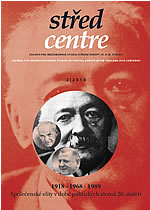Evropa – „virtuální“ a „jiná“. Globální a lokální v identifikaci východoevropských intelektuálů po druhé světové válce
“Virtual” Europe and “other” Europe: Th e Global and the Local in Self-Identifi cation of Eastern European Intellectuals after the World War II
Author(s): Boris DubinSubject(s): History
Published by: AV ČR - Akademie věd České republiky - Masarykův ústav
Keywords: Gglobalization; Modernization; Post-modernity; Intellectuals
Summary/Abstract: The author analyses the concept of “globalization” and of some alternatives to it, including them in the context of modernization process, of its different stage transformations and of functional role of the “culture” (of the European project of culture) in the dynamics of the transformation of European societies to their “modern”, “developed” status. The phenomena of the “post-modern” and of the forms of “opposition to globalization” occurring in the recent years and including anti-globalization collective actions are referred to as phenomena of “retarding” or “detained” modernization. The evidence of inner conflict among the intellectuals of Eastern Europe after the World War II, including texts of underground and the “second culture” and testimonies of the emigrants (Cz. Milosz, M. Kundera, D. Kis, G. Konrad, etc.) are elaborated on, their discussion about Central Europe from the middle and second half of the 1980´s is summed up and the shock caused by meeting the phenomena of actual nationalism and national-chauvinism in political processes following the fall of the Soviet Union is described.
Journal: Střed. Časopis pro mezioborová studia Střední Evropy 19. a 20. století
- Issue Year: 2/2010
- Issue No: 2
- Page Range: 54-81
- Page Count: 28
- Language: Czech

